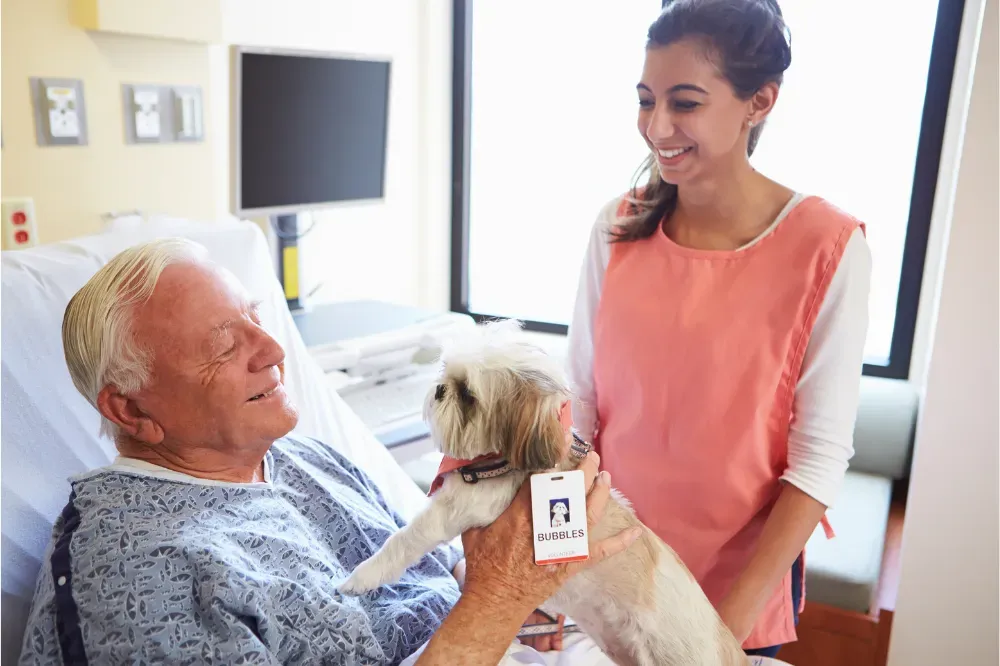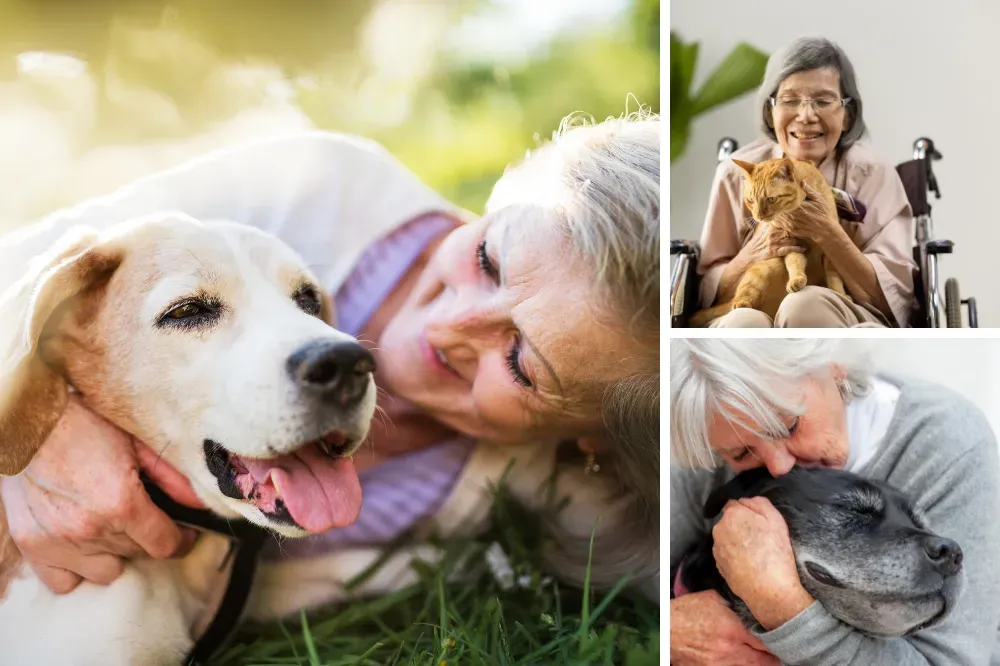As people age, maintaining mental and emotional well-being becomes increasingly important. One of the most effective ways to enhance the quality of life for older adults is through the companionship of therapy dogs, which specifically benefit seniors by providing companionship and joy. These specially trained animals provide emotional support, comfort, and a range of mental health benefits, particularly for seniors. This article explores the role of therapy dogs for seniors, highlighting how they improve mental health and provide invaluable companionship.

What Are Therapy Dogs?
Therapy dogs are specially trained animals that provide comfort and support to people in various settings, including hospitals, nursing homes, and private residences. Unlike service dogs, which are trained to perform specific tasks for individuals with disabilities, therapy dogs are primarily focused on providing emotional support and companionship. It is important to note that an emotional support animal, while also providing emotional benefits, does not have the same legal protections as a service dog under the ADA. They visit seniors living in care homes, participate in therapy dog programs, and offer comfort to those dealing with stress, anxiety, or loneliness.

Therapy Dogs vs. Service Dogs
It’s important to distinguish between therapy dogs and service dogs. Service dogs are trained to assist individuals with disabilities by performing tasks like retrieving items, guiding visually impaired individuals, or alerting to medical conditions such as seizures. These dogs have legal protections under the Americans with Disabilities Act (ADA) and are allowed in public places. In contrast, an emotional support dog provides comfort and support to individuals with mental health issues but does not perform specific tasks. Therapy dogs, on the other hand, do not have the same legal protections and are not considered service animals. They are typically used for therapeutic purposes in settings like long-term care facilities, hospitals, and schools.
The Role of Service Dog Owners
Service dog owners play a crucial role in ensuring their dogs are well-trained to assist individuals with disabilities. While the service dog cost can be substantial, many nonprofit organizations and service dog organizations provide financial assistance or subsidized training programs to make these animals accessible to those in need. For seniors dealing with both physical disabilities and mental health issues, the presence of service dogs and therapy dogs can offer significant benefits, helping them navigate daily life with greater ease.
The Mental Health Benefits of Therapy Dogs for Seniors
Reducing Feelings of Loneliness and Isolation
One of the primary benefits of therapy dogs for seniors is their ability to reduce feelings of loneliness and isolation. Many seniors experience social isolation due to factors like mobility issues, loss of loved ones, or living in care homes. Therapy dogs provide a sense of companionship, helping to alleviate these feelings and improve overall well-being by enhancing social interaction among seniors and other dog owners.

Lowering Stress and Anxiety Levels
Interacting with therapy dogs has been shown to reduce stress and anxiety levels in seniors. The presence of a calming, affectionate dog that can perform tasks such as providing comfort and companionship can lower cortisol levels (a stress hormone) and increase the release of oxytocin, a hormone associated with bonding and relaxation. This makes therapy dog visits particularly beneficial for seniors dealing with anxiety, post-traumatic stress disorder (PTSD), or other mental health issues.
Enhancing Social Interaction
Therapy dogs can help facilitate social interaction among seniors, especially in group settings like nursing homes or assisted living facilities. The presence of a therapy dog often encourages seniors to engage in conversations, share stories, and connect with others. This increased social interaction can lead to improved mood and a greater sense of community.
Improving Cognitive Function
For seniors with cognitive impairments, such as those suffering from Alzheimer’s disease or dementia, therapy dogs can provide significant benefits. Interacting with a therapy dog can stimulate mental activity, improve attention span, and even evoke memories from the past. This cognitive engagement can be particularly beneficial in maintaining mental sharpness and slowing cognitive decline.

Physical Health Benefits of Therapy Dogs
Encouraging Physical Activity
Therapy dogs can also encourage seniors to be more physically active. Even simple activities like walking a therapy dog, throwing a ball, or petting the animal can promote physical movement. Regular physical activity is crucial for maintaining mobility, strength, and overall physical health in seniors.

Lowering Blood Pressure and Heart Rate
Studies have shown that spending time with therapy dogs can lower blood pressure and heart rate, reducing the risk of heart disease. The calming effect of a therapy dog’s presence, combined with the physical activity involved in caring for or interacting with the dog, contributes to these positive health outcomes.
Providing Pain Relief
For seniors dealing with chronic pain or physical disabilities, therapy dogs can offer comfort and even help alleviate pain. The act of petting a dog can release endorphins, the body’s natural painkillers, providing relief from discomfort and improving the quality of life.
Therapy Dog Programs and Their Impact on Seniors
Therapy Dog Visits in Care Homes
Service dogs for seniors are often part of therapy dog programs implemented in care homes and long-term care facilities to provide emotional support and companionship to residents. Regular visits from therapy dogs can significantly improve the mood and well-being of senior residents, offering them a much-needed connection to the outside world.

Animal-Assisted Therapy
Animal-assisted therapy involves incorporating therapy dogs into treatment plans for seniors dealing with mental health disorders, physical disabilities, or cognitive impairments. These dogs can assist in various therapeutic activities, such as physical therapy exercises or memory recall sessions, enhancing the effectiveness of the treatment.
Nonprofit Organizations and Training Schools
Several nonprofit organizations, training schools, and service dog organizations specialize in training therapy dogs for seniors. These organizations ensure that therapy dogs are well-prepared to provide the emotional support and companionship older adults need. They also facilitate therapy dog visits to care facilities and homes, making these services accessible to a broader range of seniors.
Hearing Dogs and Other Specialized Therapy Dogs
Some therapy dogs, such as hearing dogs, are specifically trained to assist seniors with hearing impairments. These dogs can alert their owners to important sounds, such as doorbells, alarms, or phone calls, ensuring that seniors with hearing loss remain aware of their surroundings. While hearing dogs fall under the category of service dogs, they also provide emotional and mental health benefits similar to therapy dogs, making them invaluable companions for elderly individuals.

Choosing the Right Therapy Dog for Seniors
Qualifying for a Therapy Dog
Not everyone may qualify for a service dog, but therapy dogs are more widely accessible. Seniors interested in having a therapy dog visit or participating in a therapy dog program should consult with local organizations that specialize in therapy animal services. These organizations can help match seniors with a therapy dog that meets their emotional and physical needs.

Types of Dogs Used as Therapy Dogs
Certain breeds are more commonly used as therapy dogs due to their temperament, size, and ability to provide comfort. Breeds like Labrador Retrievers, Golden Retrievers, and German Shepherds are popular choices for therapy dog programs. These dogs are known for their calm, gentle nature and ability to form strong bonds with their handlers and those they assist.
Training and Certification
Therapy dogs undergo specific training to ensure they can provide the necessary support and companionship to seniors. This training often includes obedience training, socialization, and learning how to interact with people in various settings. Many therapy dog organizations offer certification programs to ensure that therapy dogs meet the required standards.
Conclusion
Therapy animals play a crucial role in enhancing the emotional and physical well-being of seniors. Their presence can reduce feelings of loneliness, lower stress levels, and encourage social interaction, making them invaluable companions for older adults. As therapy dog programs continue to grow in popularity, more seniors will have the opportunity to experience the many benefits these wonderful animals provide. Whether through regular visits to care facilities or as part of a therapy program, therapy dogs are a great way to bring comfort, joy, and companionship to the lives of senior citizens.













